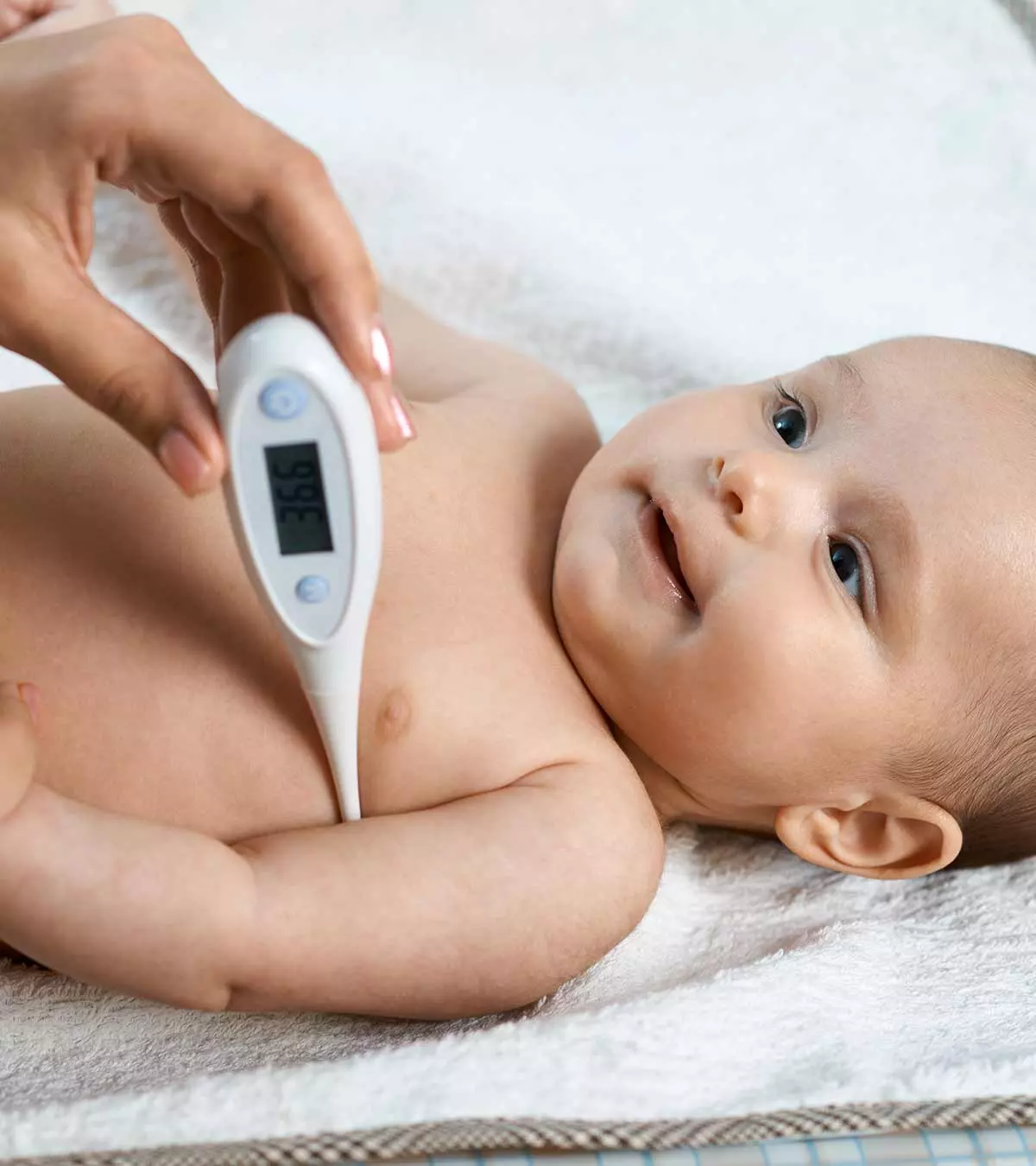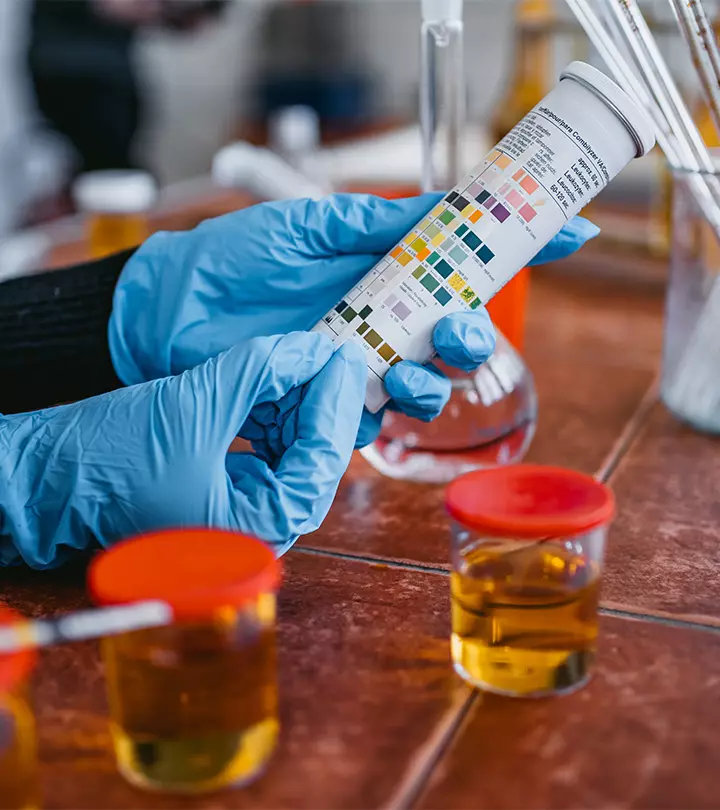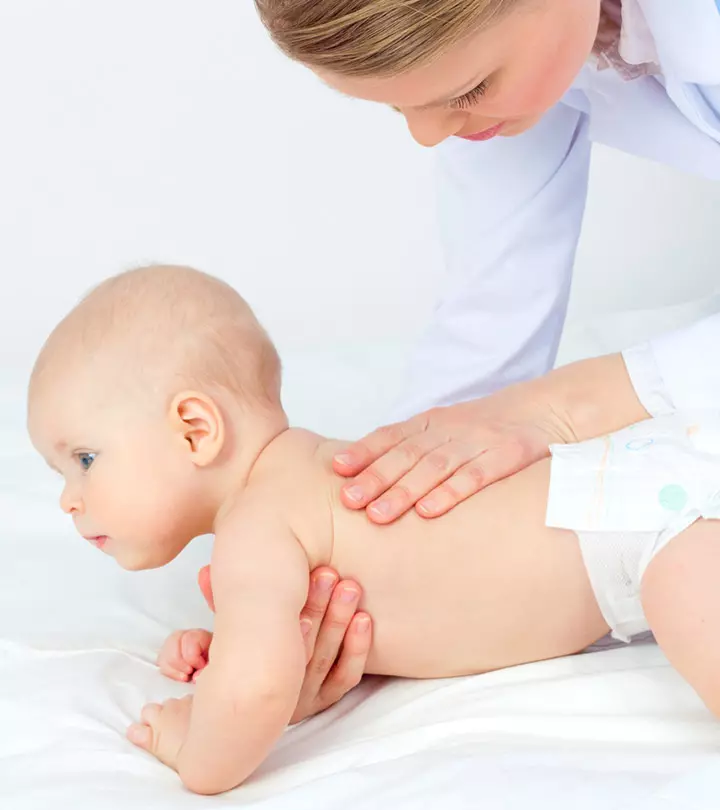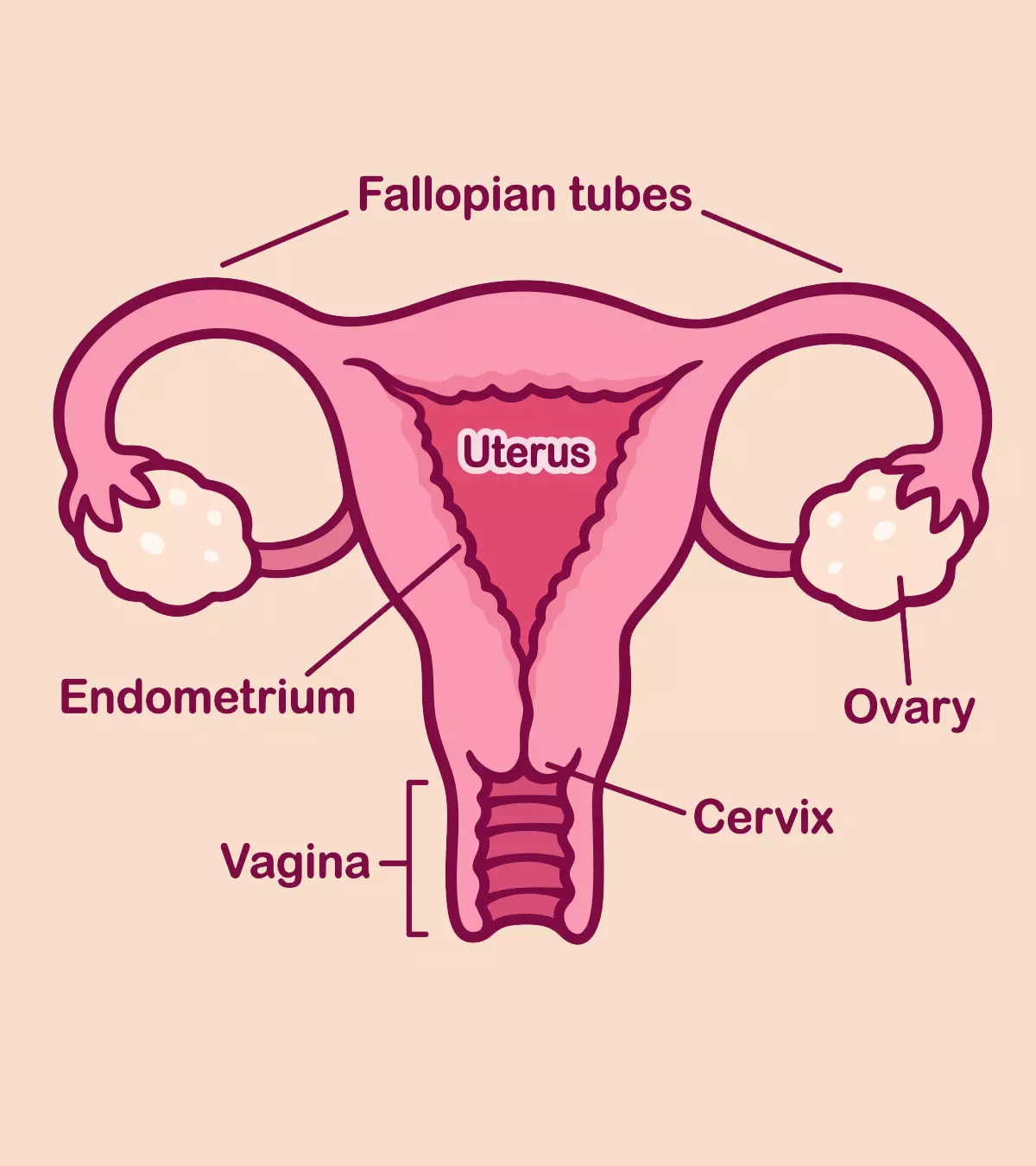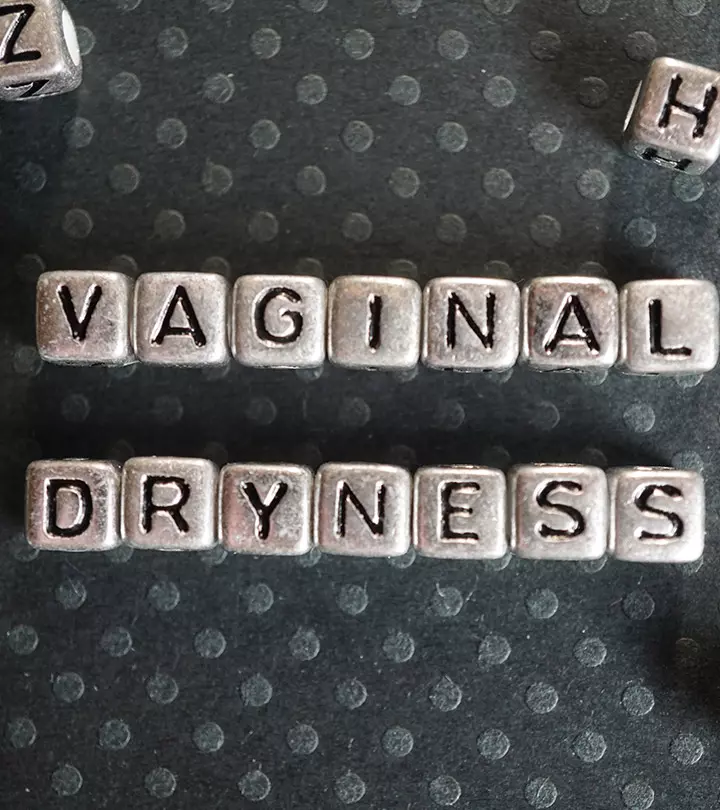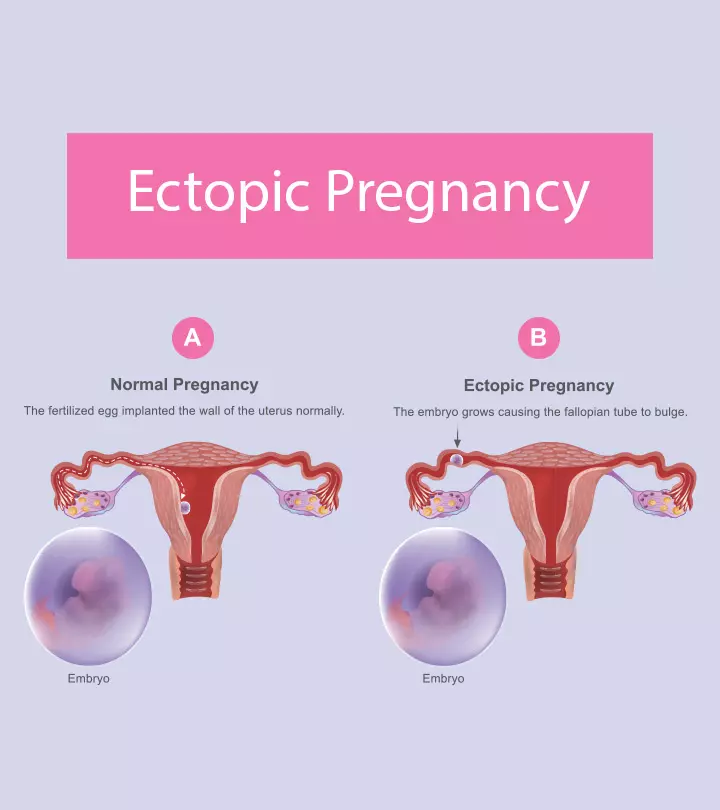
imgae: iStockphoto
Parents pay close attention to their baby’s meals and milestones as well as their poop

. While your baby’s poop color may vary depending on their food and feeding patterns, white poop in babies who are otherwise healthy is uncommon and can indicate a major problem.
The color of your baby’s feces reflects their general health and digestive system. Green, red, yellow, and other colors can be found in a baby’s poop. A newborn’s first poop is usually black, known as meconium, and is excreted in the first few days after birth (1). It’s also common for the color of the stool to vary with the baby’s age (2).
Read on to learn about the causes, symptoms, and treatment options for white or pale stools in babies.
Key Pointers
- White poop in babies is not so common and could be a cause for concern.
- Some possible causes of white poop are obstructive cholestasis, hepatocellular cholestasis, or medicines.
- It could be accompanied by gas, diarrhea, abdominal swelling, and itching.
Causes Of White Poop In Babies
The stool color of normal babies is brown-yellow due to bilirubin in the liver. Bile is composed of bile pigments, such as bilirubin and biliverdin, and bileiA digestive juice produced in the liver and stored in the gallbladder used for breaking down fats into fatty acids. salts. Bilirubin is yellow-green when produced in the liver. However, it turns brown or dark brown in the stool as it travels down the gastrointestinal tract (3).
When you observe that your baby’s poop is white, it indicates insufficient bile due to liver dysfunction or ducts’ blockage that transports bile.
The causes for white poop in babies can be:
1. Obstructive cholestasis
Cholestasis is the medical term given to slow-moving or static bile. The most common cause is obstruction of the bile duct. This condition is called obstructive cholestasis. The ducts’ blockage in the liver can occur due to the following reasons:
- Extrahepatic biliary atresiaiA disease caused by the total or partial absence of bile ducts outside the liver. ; it is the most common cause of obstructive cholestasis in 35%-45% of patients (4)
- Narrow bile duct
- Bile duct inflammation
- Bile duct cyst
- Liver infection
- Neonatal sclerosing cholangitisiA rare autosomal recessive condition similar to biliary atresia.
- Cystic fibrosisiAn inherited disorder that affects the cells that produce mucus, sweat, and digestive juices. (5)
- Alagille syndrome; a chromosomal disorder characterized by a decrease in bile ducts, occurring in 1 in 70,000 live births (6)
- A tumor or a gallstone can also cause blockage.
2. Hepatocellular cholestasis

Image: Shutterstock
There is little or no bile produced due to damage to liver cells called hepatocytes, or bile cannot leave the liver cells that produce it. There can be many reasons for hepatocellular cholestasis:
- Hepatitis
- Certain medications
- Genetic diseases, such as short bowel syndrome
- Premature birth
- Metabolic diseases
3. Medications
If your infant or baby is prescribed an antacid containing aluminum hydroxide, or if the medicine contains barium sulfate from a barium enema, they may cause pale or white stools (7).
Steatorrhea is another medical condition that can cause the stool to appear pale or slightly white due to excess fat in the poop. Food allergies and intolerances, malabsorption disorders, such as celiac disease, and pancreatic insufficiency can result in steatorrhea in babies.
Symptoms That May Accompany White Stool In Babies
White stools indicate a problem with the baby’s liver
. However, the white stool is not the only symptom of cholestasis. Other symptoms that cause white stools in babies include (8):
- Newborn jaundice, yellow skin, and eyes
- Dark yellow urine
- Abdominal swelling
- Itching all over the body, especially palms and soles
- Vomiting or nausea
- Diarrhea
- Diarrhea or constipation
- Gas
- Foul-smelling stools
- Abdominal pain or tummy ache
Is White Poop In Babies Dangerous?

Image: Shutterstock
It can be alarming if you observe pale or white poop in your baby’s diaper because it is not normal. White baby poop indicates possible problems with the baby’s liver, gallbladder, or the duct system that transports the bile to the intestines (9).
Bile accumulates in the liver because it fails to move from the digestive organ. This may damage the liver and cause liver cirrhosisiScarring of the liver tissue due to long-term damage to the liver. (8). If your baby passes white stools more than twice, you may need to consult a pediatrician (10). Also, check for other symptoms. If your baby has abdominal pain, swelling or bloatingiA condition in which the stomach feels full due to gas. , or diarrhea-like loose stools, it is recommended that you see a doctor immediately. Early diagnosis is crucial for effectively addressing this condition.
 Be watchful
Be watchfulTreatment For White Poop In Babies
Before treating babies for white poop, you must identify the underlying cause. The baby will have to undergo certain diagnostic tests to diagnose the cause. It is important to identify the underlying cause of white colored stool. Some of the diagnostic tests include:
- Blood tests
- CT scan and/or MRI to examine the baby’s duct system associated with the liver
- Ultrasound can give a clear picture of a baby’s abdominal organs
You must consider the following factors in the management of white poop:

Image: Shutterstock
- Your baby’s age
- The number and severity of symptoms
- The baby’s medical history
Depending on the cause of the baby’s white poop, your doctor will treat it with medication, and in some cases, surgical intervention may be necessary. Before the baby is two months old, you must pay attention to biliary atresia (8). Once the underlying cause of the baby’s white poop is resolved, the color of the baby’s stool will return to normal.
 Things to know
Things to knowFrequently Asked Questions
1. What foods cause white poop in babies?
White poop occurs in babies on a milk-only diet (10).
2. Can dehydration cause white poop?
Dehydration does not directly cause white poop. Some conditions that lead to dehydration may also cause pale or white diarrhea. For instance, choleraiA serious infection caused by the consumption of contaminated food or water. infection may lead to white stools that have a completely watery consistency (11).
3. Are there any dietary changes I can make to reduce white poop in babies?
No specific dietary changes can help reduce white poop in babies. So, if you notice your baby passing white stools, seek prompt medical guidance. The doctor will evaluate the underlying cause and suggest appropriate intervention or treatment.
4. How long does white poop in babies typically last?
It could depend on the cause. Once the precise cause is determined and appropriate treatment is initiated, the baby poop color gradually returns to normal.
White poop in babies may indicate insufficient bile, which may indicate problems with the liver, gallbladder, or the duct that carries bile to the intestines. It may occur due to obstructive cholestasis, hepatocellular cholestasis, or medications. You may notice jaundice, abnormal swelling, dark urine, and other symptoms in your baby that is when you should talk to your doctor about the condition. After properly diagnosing and considering the baby’s age, the severity of the condition, and medical history, doctors may suggest options, such as medications and surgeries. It is important to take prompt medical advice for a good prognosisiA medical opinion of the progression of a disease. and prevent complications.
Infographic: Foods And Changing Poop Colors
You may know that foods can affect your baby’s stool. But did you know that different colored foods can result in colored poops? Yes, the color of the poop can represent the color of the foods eaten the most or regularly.
So check this infographic out to learn and stay aware of what colored foods are likely to change your baby’s poop color.
Some thing wrong with infographic shortcode. please verify shortcode syntax
Some thing wrong with illustration image shortcode. please verify shortcode syntax
A newborn baby’s poop can vary in color, from red, black, yellow, and white, as well as in frequency. Learn what’s normal and when should you be concerned in this informative video!
References
1. Anita Chandra-Puri, Quick Dose: When’s Your Baby Poop a Problem, Northwestern Medicine
2. Susan C. Kim, Kathleen Romito & John Pope, Bowel Movements in Babies, Michigan Medicine- University of Michigan
3. The Poop Palette: What Do All of These Colors Mean?, Nationwide Children’s
4. Monica D’Amato et al., Cholestasis in Pediatrics, Revista Colombiana de Gastroenterologia
5. Cholestasis, Boston’s Children’s Hospital
6. Amy G. Feldman, Ronald J. Sokol, Neonatal Cholestasis, Neoreviews
7. Stools- Unusual Color, Children’s Hospital Colorado
8. Cholestasis, CHOC
9. The Color of Baby Poop and What it Means, Cleveland Clinic
10. Stools- Unusual Color, Seattle Children’s Hospital
11. Cholera; MSD Manual
12. Your child’s poop: An ultimate guide; Children’s Health of Orange County (CHOC)
13. Biliary Atresia Symptoms and Treatment; UPMC; Children’s Hospital of Pittsburgh
Community Experiences
Join the conversation and become a part of our nurturing community! Share your stories, experiences, and insights to connect with fellow parents.
Read full bio of Dr. Priya Thomas
Read full bio of Dr. Meenakshi Maruwada
Read full bio of Rohit Garoo
Read full bio of Ghazia Shah









